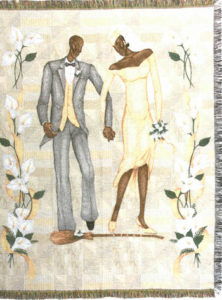
not a 'Leap of Faith'
On this date, "Jumping the Broom" is celebrated. This is an African American term and custom for marriage.
The significance of the Broom to Black heritage and history originates in the West African country of Ghana. During the Trans-Atlantic Slave Trade, the Asante or Ashanti Confederacy ruled most of Ghana in the 18th century. According to visiting British and Dutch traders who used locally made brooms, Asante's urban areas and roads were kept conspicuously clean. These same brooms were used by wives or servants to clean the courtyards of palaces or homes. In Asante and other Akan cultures, the Broom also held spiritual value, symbolizing the sweeping away of past wrongs or the removal of evil spirits.
This is where the Broom comes into play in the context of marriage. Brooms were (are) waved over the heads of married couples to ward off spirits. The couple would often, but not always, jump over the Broom at the end of the ceremony. Jumping over the Broom symbolized the wife's commitment or willingness to clean the courtyard of the new home she had joined. Furthermore, it expressed her overall commitment to the house. It also represented the determination of who ran the household. Whoever jumped highest over the Broom could be the decision-maker of the household (usually the man). Jumping the Broom does not add to taking a "leap of faith."
The irony is that jumping the Broom was largely discarded in America after the Emancipation Proclamation, which coincided with the eventual fall of the Ashanti Confederacy in Ghana in 1897 and the introduction of British customs. However, the tradition of jumping the Broom did survive in the Americas, especially in the United States, among slaves from the Asante region. This particular Akan practice of jumping the Broom was picked up by other African ethnic groups in the Americas and used to strengthen marriages during slavery among their communities.
Jumping the Broom was not a custom of slavery, but rather a part of African culture that survived American slavery, such as the Voodoo religion of the Fon and Ewe ethnic groups or the ring shout ceremony of the BaKongo and Mbundu ethnic groups. With slavery over and superficial hints of racial integration allowed, African Americans could now have European-style marriages. Jumping the Broom has nothing to do with whites.
Once Blacks could have weddings with rings that were recognizable by anyone as a symbol of marriage, the broom ceremony was no longer required. During this time, jumping the Broom fell out of practice from the stigma it carried, and in some cases, still carries, among African Americans who wanted nothing to do with anything associated with that era. The practice survived and made a resurgence after the publication of Alex Haley's book "Roots."
In the 21st century, many African and African American couples include jumping the Broom at the end of their wedding ceremonies as a tribute to tradition. Even couples who do not jump the Broom when they get married often refer to, or at least recognize, the phrase as synonymous with getting married, in the same way most Americans associate "tying the knot" with marriage.
Broom jumping is also practiced by non-Black groups and in different religions around the world, with some variation. Wiccans and Gypsies are among the groups that have developed their broom-jumping traditions.
Slavery and African Ethnicities in the Americas
Gwendolyn Midlo Hall
The fall of the Asante Empire:
The Hundred-Year War for Africa's Gold Coast
Robert B. Edgerton